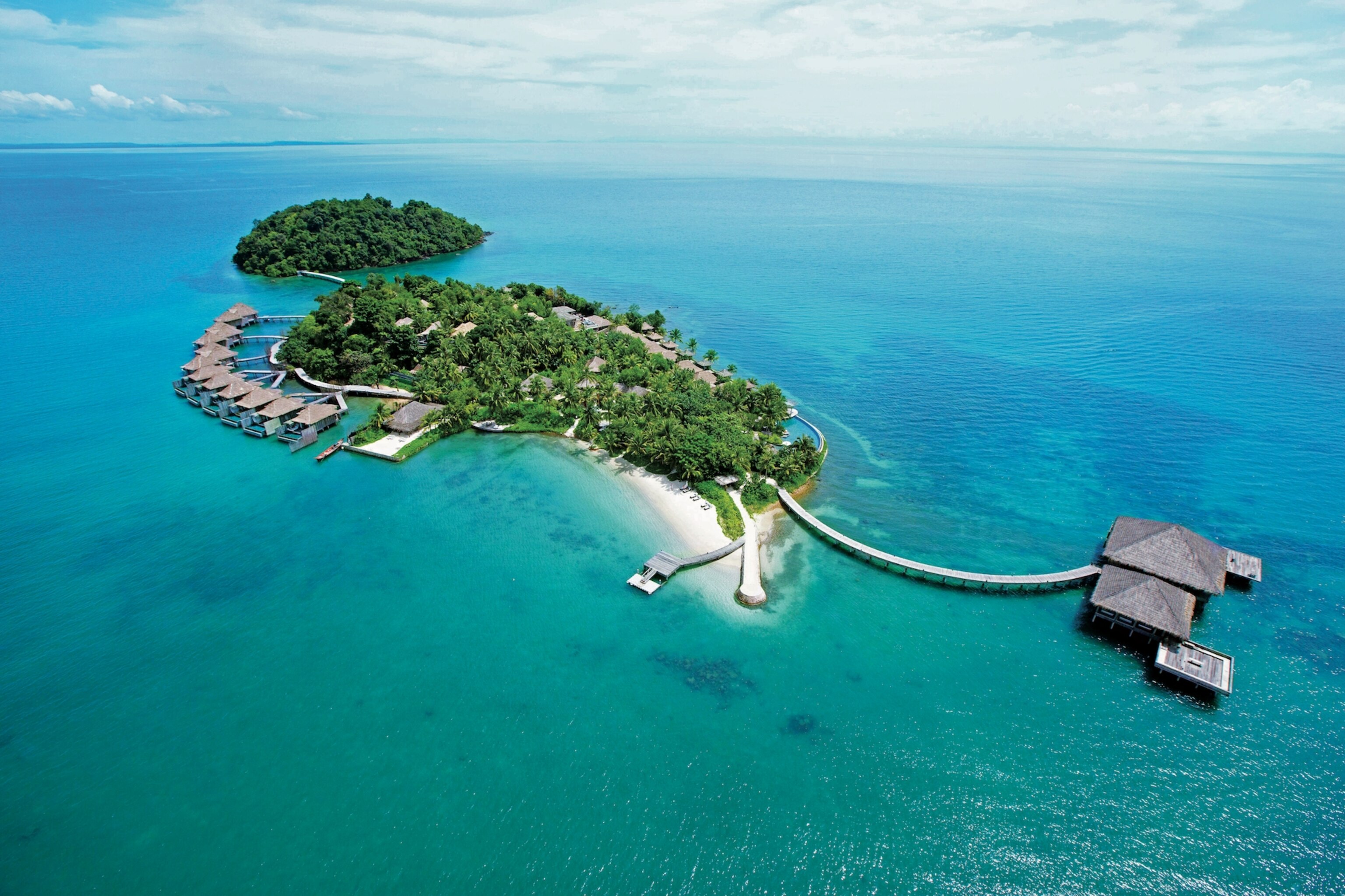
Hidden Pleasures on Private Isles
New properties offering the ultimate in seclusion, space and solitude are cropping up everywhere, from the Maldives and Madagascar to Fiji and Indonesia. What’s driving the boom?
A PRIVATE ISLAND is a modern-day king’s castle, with palm trees for turrets, and an empty ocean for a moat. Each offers a sense of privileged isolation that says more about the word “exclusive” than any first-class lounge or luxury hotel. To rent one all to yourself is to own a piece of the earth, even if just for a few days. But they don’t come cheap. Musha Cay (mushacay.com), part of the Exuma islands in the southern Bahamas, for instance, costs $210,000 for five nights (the minimum stay for up to 12 people). More accessible is a suite on a private island resort—expect to pay closer to $1,000 per person a night—with more choice available than ever before.
At the head of the private island trend was Amanpulo (rooms from $1,100; aman.com), the first private island property from cult hotelier Adrian Zecha, which opened in the Philippines in 1993 with fewer rooms than usually found at resorts, on a piece of land 1,650 feet across at its widest point. Several resorts followed suit, including Soneva Fushi (rooms from $1,036; soneva.com) in the Maldives and Fregate (rooms from $4,000; fregate.com) in the Seychelles. Guests could lie back in hammocks in these isolated parts of the world, safe in the knowledge that they were alone save for the person on standby to make them margaritas. “It was like backpacking for billionaires,” says Alice Daunt, of Daunt Travel. “Except the sheets were blissful and the taps gushed hot water.”
In the Maldives alone, there are now nearly 120 private island resorts, with a record number of visitors reported last year. It’s a trend that has spent the past decade spreading into even the most remote corners of the world, from Song Saa Private Island (rooms from $890; songsaacollective.com), in Cambodia, to Anantara Medjumbe Island Resort (rooms from $565; medjumbe.anantara.com), in Mozambique. “The growth is remarkable,” says Farhad Vladi, of Vladi Private Islands, a German broker who has sold more than 2,500 in his career. “A few decades ago private islands were extremely rare, like diamonds. Today, everyone wants a piece.”
Part of the allure is the opportunity a private island presents to cut oneself off from the world, and sometimes ven from technology. At &Beyond Mnemba Island (rooms from $1,270; andbeyond.com), in Zanzibar, rooms have been designed without televisions. It’s a way for guests to escape, to live out the ultimate Robinson Crusoe fantasy.
For some, just being on a private island isn’t enough; they hanker after the bling of Dr. No rather than the simplicity of Crusoe. “Instead of a 60-minute massage, guests want a masseuse for the week. Instead of a one-off yoga class, they want an expert yogi to work with them every day,” says Four Seasons’ regional vice president, Armando Kraenzlin. Fiji’s Laucala Island (rooms from $4,800; laucala.com) has a submarine for its guests; Manta Resort (rooms from $248; themantaresort.com),off the coast of Zanzibar, has an underwater bedroom that floats 270 yards from the shore.
Philanthropy is also a factor in private island life. Many want to be seen helping both their communities and their changing environments. When Song Saa opened in 2012 it was considered a pioneer in fostering a sustainable operation in collaboration with locals, which it supports through its Song Saa Foundation.
In 2014, The Brando (rooms from $3,190; thebrando.com) opened on French Polynesia, promising Marlon Brando’s vision for an entirely carbon-neutral resort. American entrepreneur Chris Burch’s Nihi Sumba (rooms from $795; nihi.com), on a world-class surf break in Indonesia, followed a year later with a foundation-driven model similar to Song Saa’s. In 2017, the big news was Time + Tide Miavana (rooms from $2,900; timeandtideafrica.com), in Madagascar, protecting the native forests, oceans and unique species that inhabit them. In 2018, all eyes are on Wa Ale (rooms from $500; waaleresort.com) in Myanmar, opening in October, as a conservation effort for Lampi Marine National Park, with 20 percent of net annual profits going back into the Lampi Foundation.
Vladi reports that the motivation for buying private islands to focus on conservation and sustainability has rocketed in the last decade. “It’s unbelievable how quickly it’s gone from ownership to protection,” he says.